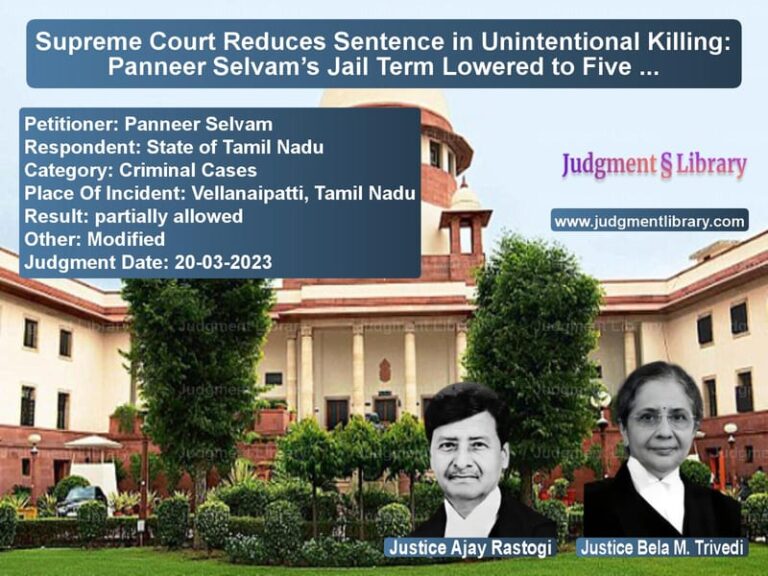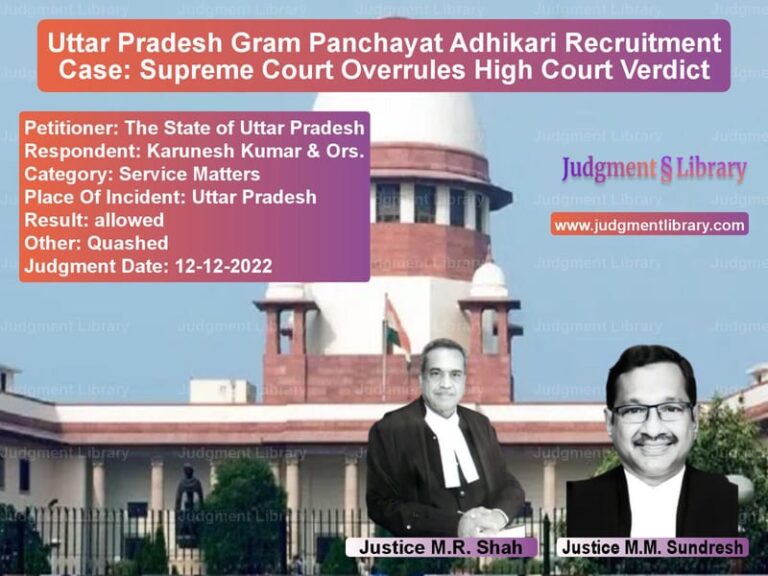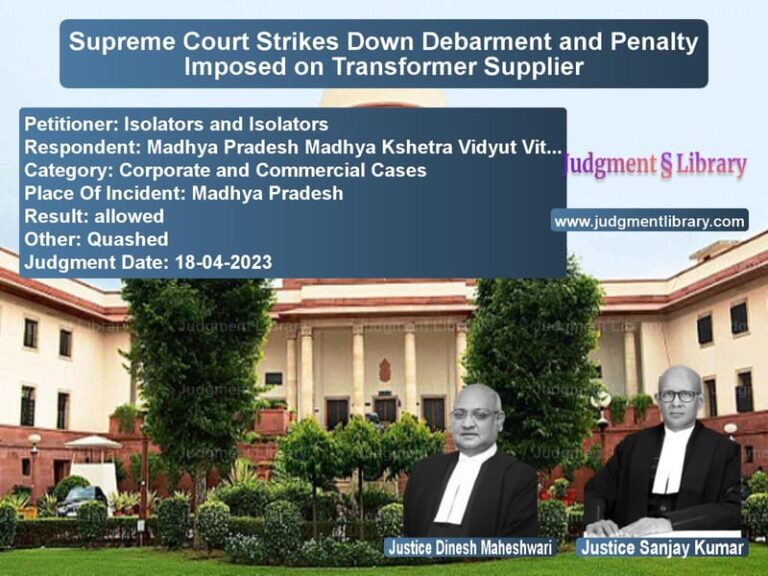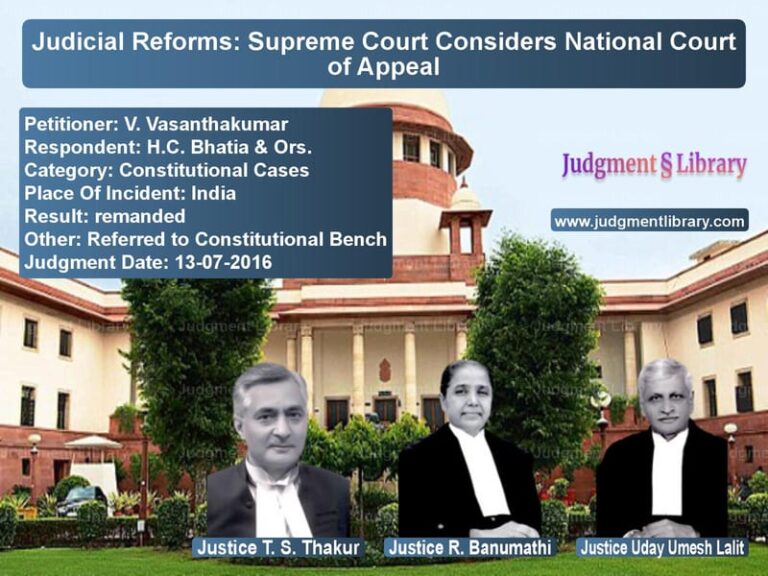Mining Lease Regulations and Environmental Clearances: A Landmark Judgment Explained
The Supreme Court of India recently delivered a landmark judgment addressing critical issues concerning the legality of mining operations. The judgment revolves around mining lease regulations, environmental clearances, and the impact of legislative amendments on leaseholders. This case primarily arose due to the suspension of mining leases, affecting several operators who failed to comply with statutory requirements.
Background of the Case
The case originated from Writ Petition (Civil) No. 114 of 2014, filed by Common Cause, and Writ Petition (Civil) No. 194 of 2014, filed by Prafulla Samantra and another. The petitioners challenged the legality of mining operations undertaken without requisite environmental approvals and lease renewals. The Court, in its previous orders, had restrained 102 mining leaseholders from carrying on mining activities, citing non-compliance with environmental clearances, approvals, and consents. This restriction was imposed on the grounds that none of these leaseholders possessed valid documents required under the Mines and Minerals (Development and Regulation) Act, 1957 (MMDR Act).
Key Legal Questions Addressed
- Whether mining operations can be conducted in the absence of a valid and subsisting lease?
- Can environmental clearances and approvals alone justify the continuation of mining operations?
- What are the legal consequences of non-renewal of mining leases under the MMDR Act?
- How does the amendment to Section 8A of the MMDR Act affect existing and expired leases?
Arguments by the Petitioners
The petitioners argued that mining leases should only be considered legal if they were active and had undergone proper renewal procedures. They contended that many mining operators continued their activities without valid lease renewals, relying solely on environmental clearances. The petitioners emphasized that the MMDR Act mandates both lease renewal and environmental approvals, and the absence of either renders mining operations illegal.
Furthermore, the petitioners cited the Supreme Court’s ruling in Goa Foundation v. Union of India, (2014) 6 SCC 590, where the Court held that mining leases cannot continue indefinitely without express renewal by the competent authorities. They argued that the leaseholders in the present case were operating under similar circumstances and that their actions amounted to unauthorized mining.
Arguments by the Respondents
The mining leaseholders, in their defense, contended that they had obtained all necessary environmental clearances, approvals under the Forest (Conservation) Act, 1980, and mining plans as required under the law. They argued that the Court’s previous orders did not explicitly mandate the existence of a subsisting lease as a prerequisite for recommencing mining operations.
The respondents also relied on Rule 24A of the Mineral Concession Rules, 1960, which provides that if an application for lease renewal is made before the lease expiry and remains pending, the lease period shall be deemed extended. They asserted that their mining operations were covered under this rule and, therefore, should not be considered illegal.
Supreme Court’s Analysis and Findings
The Supreme Court examined the statutory provisions governing mining leases, including Sections 8 and 8A of the MMDR Act. The Court observed that:
- A mining leaseholder must demonstrate a legally subsisting lease before resuming operations.
- Environmental clearances and approvals, though mandatory, do not substitute for a valid lease.
- The automatic renewal of leases beyond the first renewal is not permitted without express approval from the State Government.
- Leases that expired before the amendment to Section 8A in 2015 and were not renewed before expiry do not benefit from the extension provisions.
Key Provisions Discussed
The Court analyzed various provisions of the MMDR Act and the Mineral Concession Rules, including:
- Section 8 of the MMDR Act: Governs the duration and renewal of mining leases. Originally, leases could be granted for up to 30 years, with a first renewal for 20 years and subsequent renewals subject to State Government approval.
- Section 8A of the MMDR Act (Amended in 2015): Standardized the lease period to 50 years and eliminated discretionary renewals.
- Rule 24A of the Mineral Concession Rules: Allowed deemed extensions of mining leases when renewal applications were pending. However, this rule was amended in 2014 to restrict automatic extensions.
The Supreme Court emphasized that the amendment to Section 8A was intended to bring uniformity and eliminate arbitrariness in lease renewals. The amendment also sought to address delays in the disposal of renewal applications, which had led to the indefinite continuation of mining operations without formal approvals.
Impact of the Judgment
The judgment has far-reaching implications for the mining industry in India. Some key consequences include:
- Mining leaseholders must ensure compliance with both environmental regulations and lease renewal requirements.
- State Governments are required to expedite the processing of renewal applications to avoid legal ambiguities.
- Unapproved mining operations are subject to immediate suspension.
- The legal principle that environmental clearances alone do not validate mining activities has been firmly established.
Conclusion
This ruling reinforces the necessity of adherence to statutory requirements in mining operations. By clarifying the interplay between lease renewals and environmental clearances, the Supreme Court has provided a legal framework that ensures greater accountability in the mining sector. The judgment also underscores the need for State Governments to act promptly in processing lease renewal applications to prevent operational disruptions.
Ultimately, this case highlights the judiciary’s role in maintaining regulatory compliance in India’s natural resource sector. The Court’s ruling sets a precedent that will influence future cases involving mining lease regulations and environmental governance.
Don’t miss out on the full details! Download the complete judgment in PDF format below and gain valuable insights instantly!
Download Judgment: Common Cause, Praful vs Union of India and o Supreme Court of India Judgment Dated 04-04-2016-1741854509665.pdf
Direct Downlaod Judgment: Direct downlaod this Judgment
See all petitions in Environmental Cases
See all petitions in Judgment by Jagdish Singh Khehar
See all petitions in Judgment by C. Nagappan
See all petitions in allowed
See all petitions in supreme court of India judgments April 2016
See all petitions in 2016 judgments
See all posts in Environmental Cases Category
See all allowed petitions in Environmental Cases Category
See all Dismissed petitions in Environmental Cases Category
See all partially allowed petitions in Environmental Cases Category







